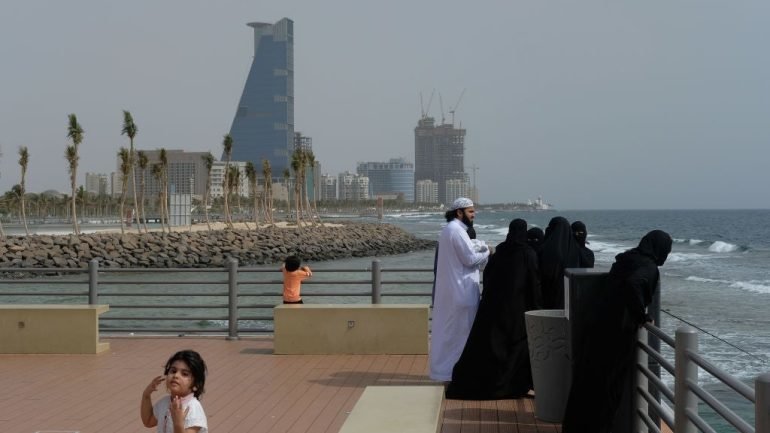
Saudi Arabia’s Water Market Undergoes Major Transformation as Demand, Desalination and Reuse Surge
Rapid growth in drinking-water, desalination and wastewater-reuse sectors underscores Riyadh’s push for water security under Vision 2030
Saudi Arabia’s water market is experiencing rapid expansion driven by population growth, urban development and strategic investment in desalination and wastewater reuse — reflecting a broader shift in how the Kingdom manages its most precious resource.
The domestic drinking water market alone is currently valued at roughly 6.2 billion US dollars and is projected to rise to more than 13.2 billion by 2035, a compound annual growth rate of about 7.9 percent.
The surge in demand comes amid heightened awareness of water scarcity: the Kingdom lacks permanent freshwater bodies and relies heavily on desalination and treated wastewater to meet urban, industrial and agricultural needs.
Recent figures show that desalinated seawater now provides around half of the country’s distributed water supply, up from 44 percent in previous years.
This shift has helped sustain access even as groundwater resources continue to deplete.
Beyond municipal supply, Saudi Arabia’s water sector has become a booming consumer market.
Bottled water consumption, water purification systems, and packaged water have all seen rising demand, driven by urbanisation, growing incomes, and greater concern for hygiene and water quality.
As tap-water reliability remains uneven, many households and businesses opt for bottled or treated alternatives.
At the same time, the kingdom has invested heavily in infrastructure and technology to support long-term water security.
Authorities are expanding large-scale desalination capacity, modernising water-distribution networks, and scaling up wastewater-treatment and water-reuse programmes.
Treated effluent is increasingly reused for irrigation, industrial processes and urban landscaping — reducing pressure on freshwater sources.
Industry analysts and government-backed reports point to a widening investment opportunity across the water-value chain: desalination plants, wastewater-treatment and reuse systems, supply-chain logistics, bottled water production, and water-treatment technologies.
According to recent estimates, Saudi Arabia already operates one of the world’s largest desalination infrastructures and ranks among the top global water-reuse markets.
Still, the underlying pressures remain stark.
Rising temperatures, population growth, and climate change continue to strain natural resources, and sustainability concerns — including energy consumption of desalination and waste management from bottled water — are intensifying.
Experts say long-term success will depend on diversified supply sources, efficient water usage, regulatory reforms, and continued innovation.
Saudi Arabia’s evolving water market thus presents a compelling blend of urgent necessity and commercial opportunity.
What emerges could redefine not only the Kingdom’s relationship with water, but also set new benchmarks for arid countries seeking sustainable water-security models amid global climate uncertainty.
The domestic drinking water market alone is currently valued at roughly 6.2 billion US dollars and is projected to rise to more than 13.2 billion by 2035, a compound annual growth rate of about 7.9 percent.
The surge in demand comes amid heightened awareness of water scarcity: the Kingdom lacks permanent freshwater bodies and relies heavily on desalination and treated wastewater to meet urban, industrial and agricultural needs.
Recent figures show that desalinated seawater now provides around half of the country’s distributed water supply, up from 44 percent in previous years.
This shift has helped sustain access even as groundwater resources continue to deplete.
Beyond municipal supply, Saudi Arabia’s water sector has become a booming consumer market.
Bottled water consumption, water purification systems, and packaged water have all seen rising demand, driven by urbanisation, growing incomes, and greater concern for hygiene and water quality.
As tap-water reliability remains uneven, many households and businesses opt for bottled or treated alternatives.
At the same time, the kingdom has invested heavily in infrastructure and technology to support long-term water security.
Authorities are expanding large-scale desalination capacity, modernising water-distribution networks, and scaling up wastewater-treatment and water-reuse programmes.
Treated effluent is increasingly reused for irrigation, industrial processes and urban landscaping — reducing pressure on freshwater sources.
Industry analysts and government-backed reports point to a widening investment opportunity across the water-value chain: desalination plants, wastewater-treatment and reuse systems, supply-chain logistics, bottled water production, and water-treatment technologies.
According to recent estimates, Saudi Arabia already operates one of the world’s largest desalination infrastructures and ranks among the top global water-reuse markets.
Still, the underlying pressures remain stark.
Rising temperatures, population growth, and climate change continue to strain natural resources, and sustainability concerns — including energy consumption of desalination and waste management from bottled water — are intensifying.
Experts say long-term success will depend on diversified supply sources, efficient water usage, regulatory reforms, and continued innovation.
Saudi Arabia’s evolving water market thus presents a compelling blend of urgent necessity and commercial opportunity.
What emerges could redefine not only the Kingdom’s relationship with water, but also set new benchmarks for arid countries seeking sustainable water-security models amid global climate uncertainty.